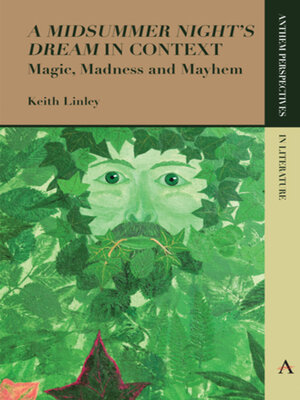'A Midsummer Night's Dream' in Context
ebook ∣ Magic, Madness and Mayhem · Anthem Perspectives in Literature
By Keith Linley

Sign up to save your library
With an OverDrive account, you can save your favorite libraries for at-a-glance information about availability. Find out more about OverDrive accounts.
Find this title in Libby, the library reading app by OverDrive.



Search for a digital library with this title
Title found at these libraries:
| Library Name | Distance |
|---|---|
| Loading... |
Everything you need to know about the cultural contexts of 'A Midsummer Night's Dream'. Is this just a light-hearted romp or is Shakespeare trying to make serious points about courtship, love, marriage and human folly? This book provides detailed in-depth discussion of the various influences that an Elizabethan audience would have brought to interpreting the play. How did people think about the world, about God, about sin, about kings, about civilized conduct, about the magic and madness of love and attraction? Historical, literary, political, sociological backgrounds are explained within the biblical-moral matrices by which the play would have been judged. This book links real life in the late 1590s to the world on the stage. Discover the orthodox beliefs people held about religion. Meet the Devil, Sin and Death. Learn about the social hierarchy, gender relationships, court corruption, class tensions, the literary profile of the time, attitudes to comedy – and all the subversions, transgressions, and oppositions that made the play a hilarious farce but also an unsettling picture of a world so close to disaster.
|The Elizabethan popular audience had a natural love of clowning, slapstick and the mayhem that was released when the rules of society were relaxed, broken or subverted. A play set on Midsummer Night and structured as a dream was going to be fun and full of the resonances associated with a festal day that had age old overtones of love, marriage, misrule and jolllity. Midsummer was traditionally celebrated with dancing and feasting and always involved secret assignations in the woods later when it was dark. Indeed, A Midsummer Night's Dream is a play with a bit of everything – magic, moonlight, mayhem, love's mad entanglements, fairies, mistakes, mechanicals as mummers, all set in the spookiness of the woods at midnight - and all of it provoking laughter.
The business of comedy was more important and serious than simply raising a laugh. It has always served a much graver purpose than mere humorous entertainment, but has also been regarded by religious, moral and cultural guardians as a lesser form than tragedy and a morally questionable one. In a world where society was strictly stratified even the arts had hierarchies. In painting devotional studies (Annunciations, Nativities, Crucifixions) were thought to be the highest endeavour, and historical subjects were thought superior to landscape and portraiture. Grotesque topics of common life (card-playing, village dances, tavern scenes) were thought of as very low art. In literature the epic poem, tragic drama, religious poetry, history plays, even lyrics and love verses were thought of as higher forms than mere comedy. Though the plays of Terence and Plautus were studied, translated and performed by schoolboys and undergraduates, and the satires of Juvenal and Horace were similarly on educational syllabuses, comedy was regarded with suspicion. It was thought to be a too vulgar form, too associated with the bourgeoisie and the commoners, too concerned with trickery, knavery and sex.
It would not be amiss to re-title the play A Midsummer Night's Nightmare, for, though matters in Athens are complicated and tense enough, the escape to the woods releases all manner of dark things and makes the entanglements even worse. The piece can be acted in two ways. The traditional approach has been to display it as a fast-moving, action-packed, farcical romp, a carnival of silliness; a light-hearted celebration of human foolishness, full of mistakes and misperceptions, nonsense and laughter, but turning out all right in the end, and not to be taken seriously as it is only a playful entertainment. It...







